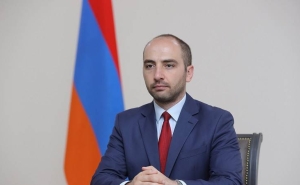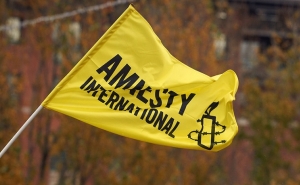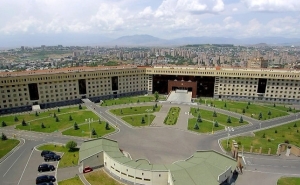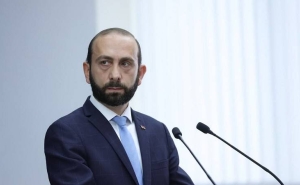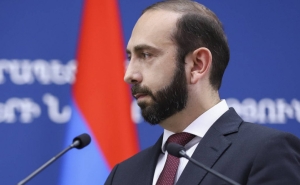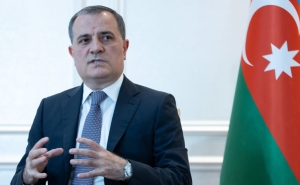 Does Azerbaijan Incite Clash of Civilizations?
Does Azerbaijan Incite Clash of Civilizations?
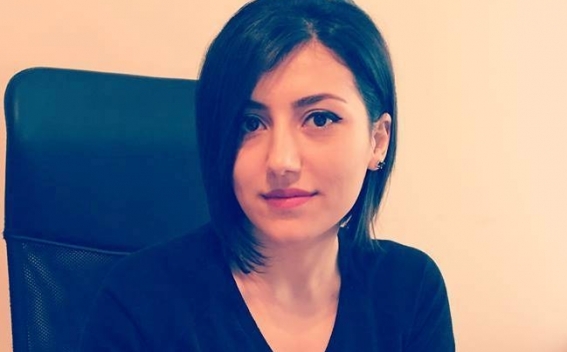
Within the framework of the 71st session of the UN General Assembly, on 19 September in New York, the first meeting of the Contact Group on Karabakh was held. The Contact Group was established within the Organization of Islamic Cooperation (OIC). Back in April 2016, in Turkey, the 13th OIC Summit decided to establish on the foreign ministers level a Contact Group on the Aggression of the Republic of Armenia against the Republic of Azerbaijan.
According to the press release from the official website of the OIC, as a result of the meeting, the Contact Group expressed the hope " to serve as a useful platform to implement OIC Resolutions as well as harmonize individual and joint efforts of the Member States in order to put an end the Armenian aggression and occupation of the territories of Azerbaijan.” During the meeting it was agreed “to formulate a roadmap to guide the activities of the Group.” By the way there was no precise period mentioned for having the road map.
In the report prepared as a result of the first meeting of the OIC Contact Group on Karabakh, it was stated that the meeting was attended by the delegations of Djibouti, Gambia, Morocco, Saudi Arabia, Turkey and Azerbaijan. The meeting was also attended by the OIC Secretary General Iyad Amin Madani, who reconfirmed the position of the organization, "condemning the aggression of Armenia against Azerbaijan." He also expressed hope that "the support of the OIC Member States for the sovereignty and territorial integrity of Azerbaijan will be transformed into practical and productive measures to force the aggressor to respect the rules and principles of international law."
Azerbaijani Foreign Minister Elmar Mammadyarov, who also participated in the meeting, expressed his confidence that "the Contact Group will become a driving force in the framework of the OIC to support Azerbaijan’s fair position." Participants of the meeting expressed their support for "the efforts of Azerbaijan to confront the Armenian attacks and protect its own people." The Contact Group also emphasized the importance of increasing pressure on Armenia by the Islamic Ummah to make "the aggressor comply with its international obligations." Moreover, the meeting of the Contact Group on Karabakh urged "member countries of the OIC to make collective efforts to bring the conflict on the international agenda."
Azerbaijan via Turkey tries to present the Karabakh conflict settlement as a problem that flows from the primary interests of the Islamic Ummah. But, in fact, the process does not go beyond propaganda. Although the formation of the Contact Group indicates that the OIC is moving from resolutions and declarations to more practical actions, the process does not attract much interest among the OIC member countries.
It is enough to recall the number of countries that participated in the meeting in New York (by the way, among them Armenia has diplomatic relations only with Morocco [1]), in spite of the numerous appeals by Turkey and Azerbaijan to join the Group. In addition, the lack of interest in the issue was also demonstrated by the fact that it was initially planned to hold the first meeting of the Contact Group on Karabakh during the OIC Summit in Istanbul in April, but the meeting never took place, and was postponed to September. Moreover, according to the Azerbaijani Foreign Ministry, Pakistan and Malaysia also were in the Contact Group, but at the meeting in New York, the representatives of these countries were not present. That is, Azerbaijan could not even ensure their presence at the meeting.
It is obvious that the statements made by this Contact Group, formed within the OIC, cannot have a significant impact on the process of the Karabakh conflict settlement, since the negotiations on Karabakh conflict settlement are held in the framework of the internationally recognized format of the OSCE Minsk Group. And the Co-Chairs of the Minsk Group themselves have repeatedly stressed that the efforts to transform the conflict to another platform can have a very negative impact on the entire process. Similarly, it was repeatedly emphasized that the attempts to give religious nature to the Karabakh conflict are illogical and fraught with dangerous consequences.
At the same time it is impossible to expect any constructive steps or discussions from this format, given the absence of the Armenian parties, as well as the fact that Turkey and Azerbaijan, as always, will do everything possible to get the anti-Armenian statements from the countries that are not aware of the Karabakh conflict.
In the end, it is impossible to speak about the productivity of the process because the OIC is not even able to solve those conflicts and disagreements that arise among its members. Accordingly, in the case of the Karabakh conflict, in which not all the parties to the conflict are members of the OIC, it is even senseless to speak about the productiveness of the organization’s activity.
Of course, this does not mean yet that we should ignore the efforts of Azerbaijan aimed at making the Karabakh conflict the topic for discussion in the largest Islamic organization, taking into account the fact that the organization is trying to play a more influential role in contemporary international relations and intensify efforts in the direction of the Karabakh conflict. In addition to underlining the inefficiency of the process, we also need to consistently work with those member countries of the OIC, with which Armenia has traditionally had strong ties in order to put an end to the discussions on the Karabakh conflict and the Azerbaijani-Turkish aspirations in the Organization of Islamic Cooperation.
[1] According to the official page of the RA MFA (by the data on 30.09.2016) Armenia has no diplomatic relations with Saudi Arabia, Djibouti and Gambia
Other materials on this subject
- Russian forces have clearly failed in their duties: senators press Biden Administration to break Azerbaijan’s blockade The United States cannot stand aside while the Aliyev regime callously threatens the lives of Nagorno-Karabakh’s citizens, and must hold Azerbaijan to account for blocking a civilian population’s access...
- US calls for the full restoration of free movement through the Lachin Corridor "We remain concerned about impeded access to the Lachin Corridor and the humanitarian implications of this situation. This sets back the peace process and undermines international confidence. We call for...
- Azerbaijani forces violate the ceasefire in Artsakh The ceasefire violation was reported to the command of the Russian peacekeeping troops.
- Azerbaijani units violate ceasefire in several directions, Artsakh’s Defense Ministry says The Armenian side has no losses. The incidents of ceasefire violations were reported to the command of the Russian peacekeeping troops.
- Russian Diplomat Reassures Armenians Over Corridor In Karabakh "The parties are in direct contact, and I assure you that the peacekeepers will not move a single centimeter until there is a new corridor," Seleznyov said.
-
 17:08
17:08The regular session of the Anti-corruption Policy Council takes place in Jermuk
-
 15:05
15:05The Prime Minister sends congratulatory messages to the supreme leader of Iran and the President of Iran
-
 11:11
11:11Armenia sends earthquake aid to Turkey
-
 10:43
10:43Commemoration of the Pontiff St. Sahak Partev
-
 09:16
09:16Some roads are closed and difficult to pass in Armenia
-
 19:55
19:55Phone conversation of the Foreign Minister of Armenia with the U.S. Assistant Secretary of State for European and Eurasian Affairs
-
 18:30
18:30Prime Minister Pashinyan and President Khachaturyan meet
-
 18:20
18:20Ararat Mirzoyan with Co-Chairman of the OSCE Minsk Group of France Brice Roquefeuil
-
 17:01
17:01Humans could land on Mars within 10 years, Musk predicts
-
 16:45
16:45France, US urge 'immediate' end to Nagorno Karabakh blockade
-
 16:01
16:01Blockaded Nagorno Karabakh launches fundraiser to support quake-hit Syria
-
 15:59
15:59Earthquake death toll in Turkey rises to 18,342
-
 15:43
15:43Ararat Mirzoyan Held a Telephone Conversation with Sergey Lavrov
-
 15:06
15:06French president rules out fighter jet supplies to Ukraine in near future
-
 14:47
14:475 Day Weather Forecast in Armenia
-
 14:44
14:44President Vahagn Khachaturyan wrote a note in the book of condolences opened in the Embassy of Syria in Armenia
-
 14:20
14:20Azerbaijan’s provocations impede establishment of peace and stability – Armenian FM tells Russian Co-Chair of OSCE MG
-
 12:57
12:57France representation to OSCE: Paris calls on Azerbaijan to restore freedom of movement through Lachin corridor
-
 11:40
11:40Command of Kosovo forces highly appreciated preparation of Armenian peacekeepers
-
 10:16
10:16The United States withdrew from sanctions against Syria for six months the provision of assistance after the earthquake
day
week
month
Humidity: %
Wind: km/h



